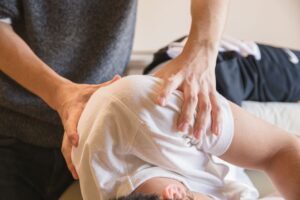Back pain is common in pregnancy. Somewhere between a half and three quarters of pregnant women have it at some stage. However, there is plenty you can do to ease the discomfort and stop it turning into a long-term problem.
Some women who had back pain before they became pregnant find it improves as their pregnancy progresses. With the right advice and treatment, it’s rare for back pain to cause difficulties in labour.
SO WHAT CAUSES BACK PAIN IN PREGNANCY?
Back pain in pregnancy can be divided into two categories:
True back pain, which is caused by the same factors as back pain in women who are not pregnant.
Pelvic girdle pain (PGP), which happens as a result of pregnancy and needs to be managed very differently to back pain.
True back pain occurs when ligaments (the tough, flexible tissues that connect your bones), muscles, discs and joints are strained by poor posture, bad lifting technique, weak or tight muscles or injury. If you suffer from this, you are likely to have had it before becoming pregnant.
It often gets worse towards the end of the day or if you have been on your feet for a long time. This is because your muscles get tired and your ligaments stretch slightly from the weight of your body and baby.
A few women, less than one per cent, will have sciatica during pregnancy. Inflammation or pressure from the back causes the sciatic nerve (which runs from your lower back to your feet) to become painful. This can send pain down your leg, or cause weakness or pins and needles.
Contrary to popular opinion, sciatica is not caused by your baby pressing on a nerve. The chances are that if you have sciatica, it would have come on whether you were pregnant or not.
Pelvic girdle pain occurs as a result of pregnancy and needs to be managed very differently to back pain. Standard treatments for back pain usually don’t work for PGP and can even make the pain worse.
If you feel pain on or around your pubic bone at the front, you may have symphysis pubis dysfunction (SPD), a condition associated with particular ligaments in your pelvis.
CAN I PREVENT BACK PAIN?
Back pain can be helped by making sure that you are as fit as possible before becoming pregnant. If you are already pregnant, it is not too late to work on your fitness. Weekly exercise, especially core strengthening, will cut your chances of suffering back pain.
If you are not used to exercising, start slowly. Checking your posture, avoiding heavy lifting and following some simple back care advice can also help to prevent problems developing. If you do have to lift anything, hold it close to your body, bend your knees rather than your back and try not to twist.
WHAT CAN I DO TO EASE MY BACK PAIN?
The following suggestions may help:
Exercises: Pelvic floor and tummy exercises can reduce the strain. Get down onto your hands and knees and level your back so that it is roughly flat. Breathe in and then, as you breathe out, squeeze in your pelvic floor muscles and pull your belly button in and up. Keep squeezing for between five and 10 seconds without holding your breath and without moving your back. Relax the muscles slowly at the end of the exercise.
Massage: This soothes tired, aching muscles. Lean forwards over the back of a chair or lie on your side. Ask your masseuse to gently massage your lower back and the muscles that run either side of your spine. A physiotherapist, your midwife or a trained massage therapist will be able to help you further.
Good posture: If you have pain over your tailbone (coccyx), try not to slump when sitting and arch your back as much as is comfortable. Try sitting on a soft or wedge-shaped cushion or a cushioned ring.
Swimming: Find out if your local pool holds aquanatal classes. They can help ease back pain during pregnancy.
Acupuncture: It is essential that you find a practitioner who is trained and experienced in using acupuncture during pregnancy.
Maternity pillows: Sleeping on your side with a wedge-shaped pillow under your tummy may help.
Heat and water: A warm bath, a hot pack or a warm jet of water from a shower head can ease discomfort.
Support belts: These take some of the weight of your baby off your tummy muscles and back.
WHEN SHOULD I SEEK HELP FROM A SPECIALIST?
If you think that you have PGP or sciatica, or if you have backache and these suggestions haven’t helped, ask to see a physiotherapist. Your GP or, in some areas your midwife, can refer you.



